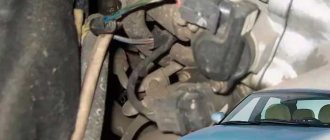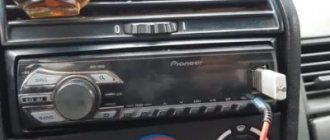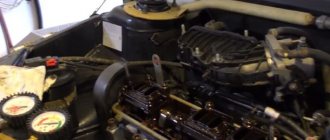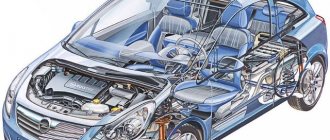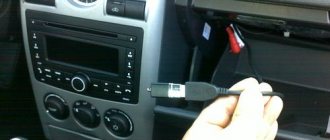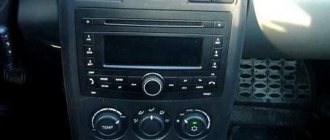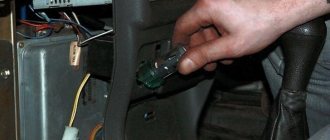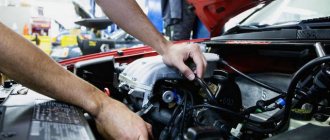Problems connecting speakers to the radio
Incorrect connection of wires can cause the device to turn off and on randomly. At the moment of a short-term increase in productivity (starting the car). There is a short circuit in the wires with a loose connection, the radio may turn itself off.
You can fix this problem yourself.
- Take out the radio.
- Check the tightness of the wires to the plugs.
- If you find that the connection is not tight, correct it by inserting the wires all the way.
If this does not help, then you need to check the wires for their integrity.
To do this you need:
- turn on the radio;
- set the noise level to medium;
- alternately disconnect and return the speaker plug to its place;
- turn up the sound.
Car radio repair
Tips and tricks
First of all, a normal battery must fully replenish the spent charge from the generator within a fairly short period of operation of the internal combustion engine. If this does not happen, it is necessary to understand why the battery is not charged from the generator or does not accumulate a charge, and also why third-party current leaks may occur.
In the first case, a common culprit is the relay regulator in the car generator. If it is not operating correctly, the battery will not be recharged properly from the generator while the engine is running, resulting in a voltage drop at each start-up that will occur no matter how hard it is for the starter to turn the engine.
A sure sign of problems with charging is a situation when the battery is new, but after a short period of time voltage dips appear, the radio turns off when the engine is started, and this did not happen from the very beginning after installing a new battery. In this case, diagnostics of the generator is necessary.
The next reason for a constant decrease in voltage may be the starter and breakdowns in this area. If the starter jams, knocking, grinding, clicking, etc. are heard when starting the engine, this indicates that the device is extremely “difficult” to spin or crank the engine for one reason or another.
Naturally, in such conditions, the starter will constantly take the maximum energy from the battery onto itself, that is, the voltage will constantly drop. In this case, the radio will also restart all the time every time you try to start the power unit. To solve the problem, you need to check the starter and other elements, the failure of which may complicate starting the engine (for example, starter bendix, etc.)
We also note that the problem element may be the battery itself. As a rule, after two or three years of active use without proper maintenance, the battery begins to gradually lose its capacity, the electrolyte in the battery boils away and turns black, the battery plates are destroyed, etc.
Finally, we would like to add that even if the battery is new, the generator and starter are working normally, there is always the possibility of so-called leaks. In other words, some devices can actively discharge the battery.
It will be useful What is battery polarity: direct and reverse battery polarity? In such a situation, you should contact an auto electrician to accurately determine the cause. Also, one should not exclude the possibility that the radio itself may be faulty, the control unit was connected incorrectly, etc.
Why does it turn off?
When the voltage in the on-board network when starting the engine drops below the set limit, the car radio turns off.
When starting the engine, the front panel of the receiver goes out for a while, and after turning off the starter and starting the engine, it lights up again and the operation of the device resumes. There are several reasons why the car radio turns off when you start the engine.
Protective function of the radio
This mechanism is built into some car players. Protection is applied to prevent disruption of the functionality of the device. The fact is that strong voltage surges when operating at high volumes can lead to settings failure or failure of the radio due to burnout of microcircuits. Thanks to the protection, the head unit does not turn off when the engine is started, but only reboots. All settings set by the user remain the same.
The car radio's protection function will work if the battery voltage drops when starting the engine due to insufficient charge or freezing temperature.
Constant shutdown of the head unit occurs due to problems in the ignition switch if the power connection is made through it. This phenomenon is caused by the occurrence of a strong voltage drop across worn or dirty contacts.
Generator problem
Another reason why the radio turns off when you start the engine is a malfunction of the generator. Problems may occur in the voltage regulator, capacitor and rectifier bridge. Due to these malfunctions, the charge from the generator received when starting the engine may be absent or insufficient to maintain the voltage required to operate the radio.
Also, the source of the problem may be a breakdown of the diode bridge or stator.
Problems will be indicated by the absence of a light on the low battery indicator in the instrument panel when you turn the ignition key, or by the same indicator lighting up while the engine is running.
The problem is in the starter
Another typical reason why the car radio and other lights go out when starting the engine is a malfunction of the starter. It is the most powerful energy consumer in the car.
If a malfunction occurs in it, the car radio will constantly turn off. The device may also reset if the voltage drop is excessive due to problems with the starter.
The problem is the leak
Current leakage can occur in different parts of the wiring due to damaged insulation or contamination of the battery case.
Because of this, the voltage in the on-board network, when the engine starts, drops more than during operation, which also leads to the car radio turning off when you start the car.
Causes and signs of incorrect engine operation at start
If, when starting the power unit of the car, vibration appears, blue smoke comes out of the exhaust pipe, and the engine smokes and shakes, then of course, not everything is in order with the internal combustion engine.
What are the reasons for difficulties in starting the engine:
Due to lack of fuel in the tank. No matter how trivial it may sound, you should always check the level of gasoline in the gas tank; perhaps the reason lies in the lack of fuel. Use of low quality fuel. Today, more than 70% of domestic gas stations sell low-quality fuel, which, in addition to fuel, may contain large amounts of water. To make sure there is no water in your gasoline, pour 1-2 liters into a bottle and leave it for several hours. If there is water, it will sink to the bottom and this will be visible immediately. Perhaps some “prankster” poured sugar into your gas tank, then a sediment may form at the bottom of the bottle. If you are the owner of a car with a diesel engine, and the engine jams and stalls immediately after starting at subzero temperatures, then perhaps the reason lies in frozen fuel. As you know, diesel can freeze in severe frost. The reason may also be a discharged battery. Every vehicle has different devices and equipment that require charging. And even when the engine is not started and all energy consumers are turned off, some devices may consume a minimum charge. For example, the cause of inoperability may be the ignition relay or fuel pump - these elements often cannot work with an incompletely discharged battery
You should also pay attention to checking the starter if starting the internal combustion engine itself has become more difficult. We should also talk about the fuel pump - this device most often provokes a malfunction in which the internal combustion engine starts and immediately stalls. Its incorrect operation, failure, as well as clogging of the fuel filter can lead to the power unit operating intermittently
If the filter element is clogged, then it simply will not be able to optimally pass fuel through itself or will pass it too slowly. In this case, gasoline will enter the cylinders, but after the engine is started, there will not be enough fuel to ensure optimal operation of the unit. Accordingly, a few seconds after starting it may stall. Think about the last time you changed the filter element - this device needs periodic replacement. Filter clogging can also occur due to the use of low-quality fuel. Another problem is the spark plugs. These devices are considered one of the main ones in the ignition system as a whole. Like any other parts, spark plugs wear out over time and when their service life comes to an end, they begin to work intermittently. In addition, the reason may lie not in wear, but in the formation of soot, which can be caused by various factors. Often carbon deposits appear in units in which the air-fuel mixture is formed incorrectly or in a car that, again, is filled with low-quality gasoline. High-voltage wires that connect the spark plugs to the ignition distributor or coil. Over time, wires can wear out, which can damage the insulation on them. If the insulation is weak, then in rain or wet weather this may cause a voltage short-circuit. Another reason why the power unit begins to behave inappropriately is the timing belt or chain. As a result of prolonged use, the adjustment of the strap may be disrupted and it will begin to wear out. This problem may occur not even when the belt is worn out, but when starting the engine in severe frost. Often, malfunctions of this kind are associated with errors in the operation of the control unit, as well as related systems. Moreover, you need to take into account that such problems are not always indicated by indicators on the dashboard. There are a huge number of reasons why errors can occur, so we will not consider them. We will tell you more about how to identify such a malfunction below. If we are talking about a carburetor engine, then the cause of the problem may be due to a failed throttle valve. Another malfunction is a broken or incorrect operation of the lambda probe. One of the most unpleasant problems for a car owner is poor compression in the cylinders of the power unit. It may be due to the fact that the service life of the internal combustion engine is coming to an end and it may be necessary to undertake a major overhaul soon (the author of the video is the Secret GARAGE channel).
Why does it turn off?
When the voltage in the on-board network when starting the engine drops below the set limit, the car radio turns off.
When starting the engine, the front panel of the receiver goes out for a while, and after turning off the starter and starting the engine, it lights up again and the operation of the device resumes. There are several reasons why the car radio turns off when you start the engine.
Protective function of the radio
This mechanism is built into some car players. Protection is applied to prevent disruption of the functionality of the device. The fact is that strong voltage surges when operating at high volumes can lead to settings failure or failure of the radio due to burnout of microcircuits. Thanks to the protection, the head unit does not turn off when the engine is started, but only reboots. All settings set by the user remain the same.
The car radio's protection function will work if the battery voltage drops when starting the engine due to insufficient charge or freezing temperature.
Insufficient battery capacity that does not correspond to the parameters of the vehicle also leads to the radio turning off.
Constant shutdown of the head unit occurs due to problems in the ignition switch if the power connection is made through it. This phenomenon is caused by the occurrence of a strong voltage drop across worn or dirty contacts.
Generator problem
Another reason why the radio turns off when you start the engine is a malfunction of the generator. Problems may occur in the voltage regulator, capacitor and rectifier bridge. Due to these malfunctions, the charge from the generator received when starting the engine may be absent or insufficient to maintain the voltage required to operate the radio.
Also, the source of the problem may be a breakdown of the diode bridge or stator.
Because of this, a faulty alternator will put a lot of stress on the battery.
Problems will be indicated by the absence of a light on the low battery indicator in the instrument panel when you turn the ignition key, or by the same indicator lighting up while the engine is running.
The problem is in the starter
Another typical reason why the car radio and other lights go out when starting the engine is a malfunction of the starter. It is the most powerful energy consumer in the car.
If a malfunction occurs in it, the car radio will constantly turn off. The device may also reset if the voltage drop is excessive due to problems with the starter.
The problem is the leak
Current leakage can occur in different parts of the wiring due to damaged insulation or contamination of the battery case.
Because of this, the voltage in the on-board network, when the engine starts, drops more than during operation, which also leads to the car radio turning off when you start the car.
The radio turns off in the pits
31.03.2015 12:35 #1
31.03.2015 12:35 # 0+
Please note the list of useful topics in the first message. Terms and the most popular models in messages are highlighted with quick tips and links to relevant articles in MagWikipedia and the Catalog. You do not need to register to explore the Forum - almost all relevant content, including files, pictures and videos, is open to guests.
Best wishes, Administration of the Car Audio Forum Radio
31.03.2015 12:47 #2
1st: Secure the GU itself properly so that it doesn’t dangle, etc. 2nd: Connect the GU directly, through a fuse, to the battery with a wire with a cross-section of 2.5 square meters. mm. 3rd: Check the standard wiring of the car, start with the ground from the battery to the body and engine, measure the voltage with the car running and switched off.
31.03.2015 13:08 #3
It can fool your head, especially if it’s glass and not English.
31.03.2015 13:09 #4
We need to work thoroughly on the third point, one day I honked the horn, but the car stalled and the radio did not work. A fuse for the engine control system and another fuse under the steering wheel blew out (I don’t even know whose it is, whether it was from the alarm system (and it was removed), or from the radio).
31.03.2015 13:21 #5
Posted by alexxey68
We need to work thoroughly on the third point, one day I honked the horn, but the car stalled and the radio did not work. A fuse for the engine control system and another fuse under the steering wheel blew out (I don’t even know whose it is, whether it was from the alarm system (and it was removed), or from the radio).
Here I recommend not to put off solving this problem; faulty wiring can easily burn the car.
31.03.2015 13:27 #6
I agree, the fire extinguisher is always under the seat
31.03.2015 14:42 #7
Posted by alexxey68
I agree, the fire extinguisher is always under the seat
It won’t help the brain and proper connection - let’s approach this issue wisely from the beginning, and rule out fires in the solution. Recommendations have already been given, all that remains is to use them.,
20.05.2015 13:12 #8
I had some free time and studied the problem. The problem is in the radio, I corrected the wiring. The problem has not gone away. It was powered by power windows; at the moment the windows were raised/lowered, the voltage dropped to 9 V, which is why it turned off. Has anyone experienced the radio turning off in pits while playing a CD? Is it difficult to troubleshoot or is it easier to buy a new radio?
20.05.2015 13:22 #9
Posted by alexxey68
Is it difficult to troubleshoot or is it easier to buy a new radio?
Where is it fixed? Is it possible to install it through something like a softening, springy one? The second option, if you drive through pits on the fly, then buy without a drive, only on flash drives. PS: UAZ loaf, reinforced springs, without a load it’s not comfortable in the pits (reminds me of Yamaha, Yamazo.), but the Clara 788 never turned off.
Why is this happening?
Currently, almost all car radio manufacturers use ISO connectors.
Consequently, the wires of almost all radio tape recorders are marked the same.
Namely flowers:
- Yellow – Constant power.
- Red – Ignition.
- Blue – Antenna power or signal wire to turn on the amplifier.
- Black – Mass.
Yellow wire.
It is completely wrong to take + from the cigarette lighter! The cigarette lighter power cord is designed only for the cigarette lighter itself.
When it is also loaded with a radio, voltage sags can occur on it.
It is the voltage drop that will lead to the radio turning off or rebooting. And because of this, the radio may not produce very high-quality sound.
Therefore, the wire must be routed directly from the battery terminal.
Important: the positive cable must be protected with a fuse of the same rating as the fuse on the radio itself, placing it as close as possible to the power terminal!
This is done in order to protect your car from fire if a wire suddenly shorts out somewhere in the area.
Black wire.
It is advisable to hang the mass on some bolt screwed to the car body, having first stripped it down to metal.
With this connection, the radio will have the most minimal voltage drop.
Red wire.
This wire controls turning the radio on and off depending on the position of the ignition key.
If you connect it to the lock correctly, then when the ignition key is in the zero position, the radio should not work.
I myself don’t like it when the red wire is connected to the ignition switch. I usually wind it with a yellow wire so that I can use the radio at any time.
Good nutrition is the key to stable operation of the radio!
Subscribe to the channel and like! I will be very pleased.
Source
Car radio overheating
Some car owners may experience overheating of the car radio. Usually this breakdown is detected in the summer. In this case, it is worth checking the cooling elements (radiators) on the back of the radio (where the wires are located). If they don’t work, and the entire back panel is hot, then you should look for the problem in the radiators.
Car radio
Most of the problems that cause the radio to turn on and off on its own are also related to other car systems, so you shouldn’t be indifferent to this problem, but fix it in a timely manner.
Club of Hyundai Sonata owners of all generations.
- Unanswered topics
- Active topics
- Search
- Users
- our team
Currently browsing this forum: no registered users and 5 guests
When starting the engine, the radio turns off: why does this happen?
Let's start with the fact that during operation of many cars, drivers notice when starting the engine that the radio tape recorder fails, the head unit turns off for a few seconds, then turns on automatically, etc. Note that this often happens with non-standard car radios, that is, when the head unit in a car is from a third-party manufacturer.
In this case, this situation in the vast majority of cases is not a malfunction, but the possibility of malfunctions should not be completely excluded. In this article we will talk about why, when starting the engine, the radio turns off and the dashboard lights dim.
When you start the engine, the radio turns off: reasons
So, the owner gets into the car, turns on the instrument lights and radio, and then turns the key in the ignition. The starter begins to turn the engine, while the instrument lighting dims to a greater or lesser extent, and the power unit turns off and restarts until the engine itself starts operating.
As a rule, this happens if the engine is not yet warmed up. If you repeat launches in the future, but this time “hot” or after a slight preliminary warm-up of the engine, the radio will no longer turn off.
It is important to understand that when the power unit starts, the starter is engaged. This device is actually an electric motor that takes energy from the battery to crank the engine crankshaft
At the same time, the starter is a powerful energy consumer. To put it simply, during operation of the starter, there is a sharp and quite strong decrease in voltage in the vehicle’s on-board network.
This voltage drop during startup is predictable. In this case, the main task remains to start the engine, and not to maintain the operation of other devices (heated mirrors and windows, headlights, radio, etc.). In other words, after turning the ignition key, all energy is sent to the starter.
If we talk about the radio, when the voltage in the on-board network drops, the power supply automatically turns off. This function is protective. The head unit itself contains a special program that restarts the car radio to protect it from freezing when the voltage drops.
However, it can be noted that this does not happen in all cases. For example, after the engine has been warmed up or the car has driven several kilometers after being idle, the radio does not restart when trying to restart the engine. Also, some power plants never turn off when starting the internal combustion engine, even if such a start is very difficult (the starter turns slowly, the dashboard dims, the headlights go out, but the music plays). Let's figure it out.
As already mentioned, the protective function of turning off the power supply at low voltage is programmed by the radio manufacturers themselves. In this case, a minimum “threshold” is established when the protection will work. This means that if the voltage does not drop below any value set by the device manufacturer, the head unit will not restart either.
In practice, everything will depend on the battery charge level and the condition of the battery. For example, the battery is slightly discharged, and the car starts in the winter after being parked overnight. Under such conditions, the starter will naturally need to turn the engine longer, since the engine oil thickens in the engine under the influence of negative temperatures, the fuel pumps and evaporates less well, etc.
The battery itself is also cold and consumes the remaining charge faster, that is, after a second or two the starter will turn more slowly, etc. It is quite obvious that all the “forces” will be devoted to starting the power unit, and a voltage drop in the on-board network will naturally occur.
Let's sum it up
As you can see, if the radio turns off when starting the engine, then this can serve as a kind of additional indicator of the condition of the battery, as well as the quality of its charge from the car’s generator, the serviceability of the main unit itself and its connection, etc.
In simple words, one-time restarts of the head unit during a cold start of the power unit can be considered the norm, but constant shutdowns will require additional attention.
As a summary, we note that some devices (especially budget versions from the lower price segment) may not have any protection at all. It turns out that such power units do not react in any way to starting the engine, but this does not mean that a voltage drop in the vehicle’s on-board network does not occur.
Why is this happening?
Currently, almost all car radio manufacturers use ISO connectors.
Consequently, the wires of almost all radio tape recorders are marked the same.
Namely flowers:
- Yellow – Constant power.
- Red – Ignition.
- Blue – Antenna power or signal wire to turn on the amplifier.
- Black – Mass.
Yellow wire.
It is completely wrong to take + from the cigarette lighter! The cigarette lighter power cord is designed only for the cigarette lighter itself.
When it is also loaded with a radio, voltage sags can occur on it.
It is the voltage drop that will lead to the radio turning off or rebooting. And because of this, the radio may not produce very high-quality sound.
Therefore, the wire must be routed directly from the battery terminal.
Important: the positive cable must be protected with a fuse of the same rating as the fuse on the radio itself, placing it as close as possible to the power terminal!
This is done in order to protect your car from fire if a wire suddenly shorts out somewhere in the area.
Black wire.
It is advisable to hang the mass on some bolt screwed to the car body, having first stripped it down to metal.
With this connection, the radio will have the most minimal voltage drop.
Red wire.
This wire controls turning the radio on and off depending on the position of the ignition key.
If you connect it to the lock correctly, then when the ignition key is in the zero position, the radio should not work.
I myself don’t like it when the red wire is connected to the ignition switch. I usually wind it with a yellow wire so that I can use the radio at any time.
Good nutrition is the key to stable operation of the radio!
Subscribe to the channel and like! I will be very pleased.
Source
How to fix the problem?
To prevent the radio from turning off when starting the car, it is necessary to eliminate the reason that provokes this.
Repair depends on the nature of the malfunction, so after identifying malfunctions, you need to select the appropriate item and follow the recommendations:
- If the measurements reveal a leak, you need to identify the consumer who takes current when the ignition is turned off. To do this, remove the fuses one by one and close the circuit, checking the indicators. Most often, the problem lies in the radio, car recorder or alarm, but there may be other reasons. If skills and knowledge are not enough, it is better to entrust the repair to an auto electrician.
- If the starter malfunctions, it is unlikely that you will be able to repair it yourself. In this case, it is best to remove the assembly and take it to a specialized workshop to replace all worn parts. Or take the car to a service center so that all the work can be done there, but this option will be one and a half to two times more expensive.
- Repairing a generator without knowledge and a minimum set of equipment is also difficult. And in this case, it is easier to entrust the work to specialists to resolve all issues. After repair, be sure to take measurements again to make sure that the generator produces the required voltage.
- To bypass the radio's protection system, do not connect it directly to the battery. You should purchase a capacitor with a capacity of 22,000 microfarads and a diode (it is selected according to the characteristics of the fuse in the radio). The capacitor is soldered between the power wires of the tape recorder, and the diode is on the positive wire in front of the battery. When starting the engine, the diode will not allow the voltage from the capacitor to go into the on-board network, but will direct it to the radio, so there will be no difference and the equipment will no longer turn off when starting.
Troubleshooting methods are not within the capabilities of every car enthusiast, so it’s easier and faster to entrust repairs to professionals. But, if knowledge and skills allow, any of the problems can be solved independently.
For your information!
In some car models it is easier to buy another starter or alternator than to restore the old one.
It is not difficult to identify the reason for turning off the radio if you follow the recommendations. We must not forget that there may be more than one malfunction. In this case, if the repair does not produce results, you need to continue the diagnosis and eliminate another breakdown, if any.
When you start the engine, the radio turns off: reasons
So, the owner gets into the car, turns on the instrument lights and radio, and then turns the key in the ignition. The starter begins to turn the engine, while the instrument lighting dims to a greater or lesser extent, and the power unit turns off and restarts until the engine itself starts operating.
As a rule, this happens if the engine is not yet warmed up. If you repeat launches in the future, but this time “hot” or after a slight preliminary warm-up of the engine, the radio will no longer turn off.
It is important to understand that when the power unit starts, the starter is engaged. This device is actually an electric motor that takes energy from the battery to crank the engine crankshaft
At the same time, the starter is a powerful energy consumer. To put it simply, during operation of the starter, there is a sharp and quite strong decrease in voltage in the vehicle’s on-board network.
This voltage drop during startup is predictable. In this case, the main task remains to start the engine, and not to maintain the operation of other devices (heated mirrors and windows, headlights, radio, etc.). In other words, after turning the ignition key, all energy is sent to the starter.
If we talk about the radio, when the voltage in the on-board network drops, the power supply automatically turns off. This function is protective. The head unit itself contains a special program that restarts the car radio to protect it from freezing when the voltage drops.
However, it can be noted that this does not happen in all cases. For example, after the engine has been warmed up or the car has driven several kilometers after being idle, the radio does not restart when trying to restart the engine. Also, some power plants never turn off when starting the internal combustion engine, even if such a start is very difficult (the starter turns slowly, the dashboard dims, the headlights go out, but the music plays). Let's figure it out.
As already mentioned, the protective function of turning off the power supply at low voltage is programmed by the radio manufacturers themselves. In this case, a minimum “threshold” is established when the protection will work. This means that if the voltage does not drop below any value set by the device manufacturer, the head unit will not restart either.
In practice, everything will depend on the battery charge level and the condition of the battery. For example, the battery is slightly discharged, and the car starts in the winter after being parked overnight. Under such conditions, the starter will naturally need to turn the engine longer, since the engine oil thickens in the engine under the influence of negative temperatures, the fuel pumps and evaporates less well, etc.
The battery itself is also cold and consumes the remaining charge faster, that is, after a second or two the starter will turn more slowly, etc. It is quite obvious that all the “forces” will be devoted to starting the power unit, and a voltage drop in the on-board network will naturally occur.
However, after the engine starts and runs for some time, the battery replenishes the lost charge thanks to the operation of the car generator. The oil in the engine also thins out, etc. This means that when restarted, it will be much easier for the starter to start the internal combustion engine, that is, there will no longer be a significant voltage drop. In this case, the protection of the car radio will no longer work, since the voltage simply will not drop to the minimum required by the manufacturer of the head unit.
Radio protection system
For the driver, the main goal is to start the engines. Support for any other devices is relegated to the background. All the energy available in the battery is used to operate the starter. The radio does not have enough power and turns off. Many car enthusiasts are very nervous about this, but this is not a minus, but a plus. If the radio turns off when you start the engine, then the voltage is low, and the device, especially of Chinese origin, may not work correctly. To prevent serious failures in the circuitry or software, the system automatically turns off - this is how protective mechanisms work.
When the car has already driven a certain distance and the engine has been turned off, when you try to start it again, the radio will not turn off. The amount of energy increased due to the battery being recharged by the generator.
Manufacturers also took these points into account: most radio tape recorders have a so-called threshold for triggering protective functions. The condition of the battery must be taken into account.
The radio only works when the ignition is off and the key is turned all the way. As soon as you start moving it towards the ignition at least a little, the radio that is turned on turns off. I return the key and it turns on.
All other devices work fine. Headlights, wipers, heated rear window, fan and so on.
The problem appeared about a week ago, I bought the car itself a month ago. The car is a 2009 n150.
What could this even be other than a contact group?
It's the contact group - the spring in it has weakened, that's why the radio turns off
I thought that if the radio is connected so that it works even without a key, then the contact group should not have an effect. No, is the circuit still closed through the contact group?
by default it is connected via KG
I do not have a standard radio (my fault for not writing in the op post), and it is connected in such a way that it works without a key. Or rather it worked (:
You yourself wrote that when you manipulate the CG, the radio tape recorder stops working, which means something is wrong with the CG or somehow it contributes to this! I have a question: I changed the KG and now when I take the keys out of the ignition, the radio works and when arming it also works, it turns off only with the OFF button. With the old KG, when the keys were removed, the radio turned off. PS: What should be the correct way? Should it turn itself off or not?
and when the key is pulled out, the cylinder pops out a couple of mm? Maybe the larva is already rowing? The radio should turn off when the key is removed.
Did not notice. will have to look. I didn’t touch the larva! I only changed the KG and that’s it.
It worked as expected! I disassembled and reassembled the CG and everything worked! Most likely, the pin with the spring in the ignition switch somehow jammed, which pushes the cylinder 1-2 mm in the ignition switch.
Did not notice. will have to look. I didn’t touch the larva! I only changed the KG and that’s it.
It worked as expected! I disassembled and reassembled the CG and everything worked! Most likely, the pin with the spring in the ignition switch somehow jammed, which pushes the cylinder 1-2 mm in the ignition switch.
Doesn't turn on
One of the reasons why the tape recorder in the car does not work, although there is power, is a blown fuse. This can happen due to overload caused by listening to music at high volume for a long time or a short circuit in the speaker wiring. As a result of this malfunction, the radio refuses to turn on.
To fix the problem, remove the device and remove the fuse. Its rated current is 5 or 7.5 A. Since it is impossible to accurately determine by appearance whether the fuse is intact, the serviceability of this part is checked using a tester or multimeter.
The next reason why the radio does not turn on is a break or chafing of the power wires. The contact in the standard block could also come loose due to contamination or loose connectors. To fix this problem, you should carefully inspect the wiring and connectors.
Particular attention is paid to the connection of the receiver to ground or the car body. Broken wires should be replaced and connected as securely as possible
Incorrect connection also leads to the fact that the radio in the car does not turn on. To resolve this problem, you should carefully inspect the wiring. You can identify the wires coming from the battery using a test lamp. Wiring to speakers is often done with two-core cables.
To make the correct connection, the positive pole of the battery power is connected to the red and yellow wires of the car radio, and the negative pole to the black wire. The blue wire must be connected to an active antenna or amplifier. If the positive wire from the battery is connected to the red wire, and the yellow wire is connected to the ignition switch, then the audio device will not turn on until the key is turned.
Another common reason why the radio stops working is an internal malfunction of the audio device. The amplifier and controller microcircuits burn out due to voltage surges in the on-board network caused by a generator malfunction. Sometimes the radio display lights up but there is no sound. In this case, the receiver must be replaced or repaired. The operation of the generator is checked at a car service center.
How to prevent the radio from turning off
The generator and starter need to be checked. A short circuit in the windings is determined by their darkening or heating of faulty parts and components. Leaks in the battery case can be detected using a tester. To do this, touch one of the battery terminals with one probe of the device, and touch different points of the case with the other. A deviation of the arrow will indicate the presence of a leak. To eliminate it, you should wipe the car battery case. The tester will also help you more accurately check the starter, generator and wiring for short circuits or leaks. Faulty parts and assemblies must be replaced.
You can prevent the radio from turning off when you start the engine by replacing a worn or weak battery with a more powerful one if its capacity does not match the engine parameters. As a result, the voltage in the vehicle’s on-board network will drop less when the engine starts. It is necessary to check the car wiring for damage.
If the radio was connected through the ignition switch, then it is recommended to connect it directly to the battery. This helps relieve the load on the ignition switch and will protect the receiver from turning off when starting the car engine. If the radio continues to turn off, it should be turned off manually before starting the engine, and then turned on again.
- Mystery MMTD 9122S
- The radio does not turn on
- The radio turns off when the volume is increased
- How to make a linear output in a car radio
Low voltage when starting the engine: how to find the cause
Let's start with the fact that the battery is not always the culprit of all troubles, although quite often reduced voltage occurs as a result of problems with the battery. In any case, before you start diagnosing a car regarding electrical parts, you must have a special auto tester (multimeter).
It is important that the device accurately measures certain parameters. As a rule, the functionality of the device should allow you to measure voltage, resistance, current
At the same time, when troubleshooting voltage-related problems, you also need to take into account the crankshaft speed.
Checking the car battery
So, when diagnosing, you need to start by checking the battery, as well as the car generator. The condition of the battery is assessed by connecting the tester to the battery terminals. Normally, the voltage on the battery, taking into account the absence of load (all consumers are turned off), should be at least 12.6 V. A decrease in this indicator means that there is a partial undercharge or problems have arisen with the battery itself (sulfation of the plates, boiling off of the electrolyte, etc.).
You can also measure the voltage with a voltmeter, turning on the side lights and high beam headlights for the load. Typically, the discharge current under such a load (taking into account the installed halogen incandescent lamps) is about 5–6 A, and the voltage is about 11.5 V. If this is the case, then the battery is working and the problem needs to be looked for further.
Quick starter diagnostics
If we talk about the voltage directly at the moment of starting (when the starter turns), the voltage at the battery terminals should not fall below 9.5 V. In cases where this happens on a working and charged battery, it can be argued that a starter malfunction has occurred. In other words, the starter requires too much electrical energy when operating, which should not normally be the case.
Let us add that to measure the current you need an ammeter, which is connected to the gap. At the same time, it is highly not recommended to break the circuit in a car; also, not all ammeters are able to work correctly and record high readings that occur when the internal combustion engine is started.
For this reason, it is better to have a special motor tester for such tasks. The main advantage of the device is that the measurement accuracy is quite high, and there is no need to connect the tester to the break, since the device has separate sensors. These sensors are overhead and work even through wire insulation. These elements are capable of effectively recording changes in magnetic field strength when a current of one or another magnitude passes through the wires in the circuit.
When starting the engine, power to the VAZ is lost
- Registration
- Entrance
- To the beginning of the forum
- Forum Rules
- Old design
- FAQ
- Search
- Users
I can’t say anything about the starter, we’ll have to look. What should you look into, maybe there is an apocalypse there.
In the CY everything seems to be normal, the fuses are intact. I wonder why the signal doesn’t even loom
First of all, you need to check the battery, and then further along the chain - fastening the terminals, ground fastenings, CV, starter.
Brrrrr. Kuyovo, of course, do this at - 22
I screwed the terminals in crappy way. it was like that for me.
screwed it up, so what now? Did the battery get drunk or what? I then screwed it on again and there was silence
Perhaps the terminal inside the battery has burnt out. At least check it with a light bulb.
I have a multimeter, why use a light bulb))
In some cases, a light bulb is more informative: when measuring voltage, a multimeter takes a very small current from the battery, and can measure the voltage even with an annealed wire. The light bulb loads the battery not by microamps, but by real current, and a break, if there is one, will appear. It’s sad, but it looks like your wire inside the battery has really burnt out, it’s good that this is a warranty case (the main thing is not to let it slip that you were not charging the battery in the car, in general it’s better to replace all the nuts on the terminals with new ones so that it’s not noticeable that they are often used unscrewed)
I didn’t charge it at home, I just brought it in to keep it warm. It is clear that this is a warranty case, it is only 3 weeks old. Bought from an official dealer, went to a special Bosch stand to check the electrics in the car, without this check it would not have been covered under warranty. It would be a shame if it was a waste of time; the previous owner had a 66 Ah homemade battery that worked for 5 years without any problems.


